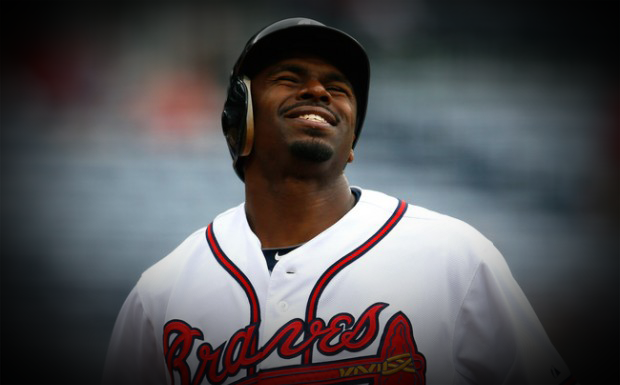
Bourn may ring in the New Year without a new team
Scott Boras is the excellent employee everyone loves to hate. Fans despise him because they blame the super agent for high player salaries and think it correlates to higher ticket prices.
Owners hate him because he never settles for less than top dollar, in some cases in lieu of any other variables.
Sometimes, when you go for top dollar, you over-estimate the market.
Boras is experiencing this presently with both Rafael Soriano and Michael Bourn.
The former is sitting out there with no team even rumored to be in on him with a qualifying offer turned down previously in the winter.
The latter was supposed to be the premiere centerfielder on the market and second outfielder behind Josh Hamilton.
Bourn was rumored to be the more of a sure thing behind Hamilton, who suffers from past substance abuse and injury issues, which was likely to make his contract approaching or exceeding $100 million dollars.
Here is why it won’t happen:
The two biggest variables working against Michael Bourn are Carl Crawford and the qualifying offer.
Crawford was the latest “speed demon” out fielder to sign a major contract, an infamous, seven year – $142 million dollar deal with the Boston Red Sox, who have since dumped him off to the Los Angeles Dodgers, a mistake only forgivable once and one no other team is going to want to repeat.
Furthermore, with the Dodgers having a full outfield, the Yankees under contract restraints and with a full outfield and the Red Sox having no interest in a long-term deal for what would be a third center-fielder on the roster, it takes a lot of the big market teams out of the market.
Comparing the two players is a nice start:
Crawford career 162 game average: .292/.332/.774, 37BB, 104K, 14HR, 77RBI, 50SB (including injured years in Boston after his contract)
Bourn career 162 game average: .272/.339/.365, , 55BB, 126, 4HR, 40RBI, 51SB.
It’s not even close.
Shrinking market
Presumably, you pay top dollar because Bourn plays a premium position, steals bases and plays excellent defense.
But it’s a joke to think he’s an elite lead-off man. He’s a serviceable table-setter at the top of the lineup with his excellent base running, but .339 doesn’t cut it for elite pay, particularly when you do very little else.
Bourn, in a walk year, also was a little different last season, slugging nine home runs, but striking out 155 times and stealing just 42 bases in 55 attempts.
It was almost as if he wanted to prove he was more than speed and defense and ended up looking even more mediocre in the process.
Call it, Curtis Granderson” syndrome, except without the explosion of long balls.
Suffice it to say Bourn is not Carl Crawford (or Curtis Granderson, or even Jacoby Ellsbury) and he doesn’t have the market left to command top dollar.
The Yankees. Red Sox, Diamondbacks, Braves Tigers, Reds, Cubs, Blue Jays, Angels, and others have gone elsewhere to sign other outfielders.
The Rangers and Mariners are said to be seeking power to fill their outfield needs.
The D-Backs, Pirates, Angels, and Blue Jays have an excess of players and could be viable alternative options on the trade market.
The Nationals now have Denard Span.
Bourn wouldn’t make much sense for the Mets (not the pieces they’re looking for), Padres (money), Rays (money) or Marlins (money).
Teams like the Indians, Twins and Astros are probably not ready to commit to a big contract since they are not close to competing.
It really leaves teams like the Phillies, who recently traded for Ben Revere, so scratch them, or maybe the White Sox.
Possibly the Seattle Mariners or Texas Rangers get desperate and turn to Bourn anyway.
The Braves tendered an offer to Bourn at the end of the season.
Consequently any team with an unprotected first-round pick will have to send the Braves their first-round pick just so they can sign Bourn.
We’ve seen what happens to most players who wait this late in a season and we are recognizing the power of the qualifying offer, which not only gives another team a draft pick, but takes away money from the accepting team to spend in the draft, a real concern with the new CBA rules.
Bottom Line
Bourn is clearly not worth in the $17 million+ range for a long-term deal that Crawford was, particularly because he is already turning 30 years old.
He’s unlikely to settle on a one year deal since it’s unlikely many teams will pay more than the $13 million dollars he already turned down, plus give up a pick to do it.
The alternative means in an offseason of bloated salaries, Bourn may be on the outside looking in, to the tune of a four or five year deal at a maximum of $15 million per year, and that’s being generous.
Don’t be surprised to see Bourn signed to 3-4 years at $45-60 million dollars despite all the early offseason hype.
Baseball is changing and Scott Boras may have missed the boat on this one.
